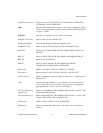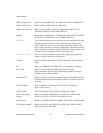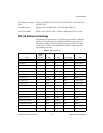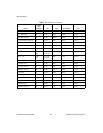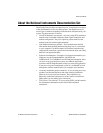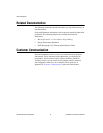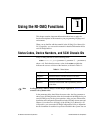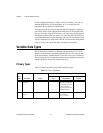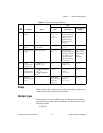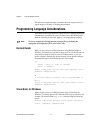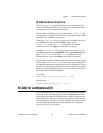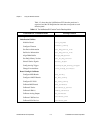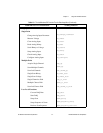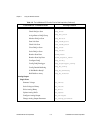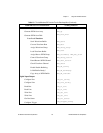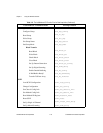
Chapter 1 Using the NI-DAQ Functions
©
National Instruments Corporation 1-3 NI-DAQ FRM for PC Compatibles
Arrays
When a primary type is inside square brackets (for example, [i16]) an array
of the type named is required for that parameter.
Multiple Types
Some parameters can be in multiple types. Combinations of the primary
types separated by commas denote parameters with this ability, as in the
following example:
[i16], [f32]
u16 16-bit unsigned
integer
0 to 65,535
unsigned
short for
32-bit
compilers
Not supported by
BASIC. For functions
that require unsigned
integers, use the
signed integer type
instead. See the i16
description.
Word
i32 32-bit signed
integer
–2,147,483,648 to
2,147,483,647
long Long
(for example:
count&
)
LongInt
u32 32-bit unsigned
integer
0 to 4,294,967,295
unsigned
long
Not supported by
BASIC. For functions
that require unsigned
long integers, use the
signed long integer
type instead. See the
i32 description.
Cardinal
(in
32-bit operating
systems). Refer to
the i32
description.
f32 32-bit
single-precision
floating point
–3.402823 x 10
38
to
3.402823 x 10
38
float Single
(for
example:
num!
)
Single
f64 64-bit
double-precisio
n floating point
–1.797683134862315
×
10
30
8
to
1.797683134862315
×
10
308
double Double
(for
example:
voltage#
)
Double
STR BASIC or
Pascal character
string
—
Use character
array terminated
by the null
character
\0
String
(for
example:
filename$
)
String
Table 1-2.
Primary Type Names (Continued)
Type
Name
Description Range
Type
C/C++ Visual BASIC
Pascal (Borland
Delphi)



